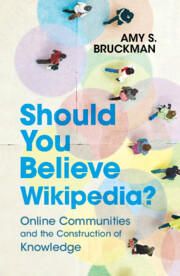Crossref Citations
This Book has been
cited by the following publications. This list is generated based on data provided by Crossref.
Jang, Jaeyoung
and
Kim, Beomsoo
2022.
The Impact of Potential Risks on the Use of Exploitable Online Communities: The Case of South Korean Cyber-Security Communities.
Sustainability,
Vol. 14,
Issue. 8,
p.
4828.
McAuley, James White
and
Nesbitt-Larking, Paul W.
2022.
Imagining the Post-COVID-19 Polity: Narratives of Possible Futures.
Social Sciences,
Vol. 11,
Issue. 8,
p.
346.
Arifani, Yudhi
Hidayat, Nur
Kharis, Muhammad
and
Rosyidah
2022.
Book review: Wikipedia and the Representation of Reality.
Global Media and Communication,
Vol. 18,
Issue. 3,
p.
401.
Ciolfi, Luigina
Lewkowicz, Myriam
and
Schmidt, Kjeld
2023.
Handbook of Human Computer Interaction.
p.
1.
Tague, Christina
and
Brandt, W. Tyler
2023.
Critical zone science in the Western US—Too much information?.
Frontiers in Water,
Vol. 5,
Issue. ,
Barnes, Naomi
2023.
Review of Amy S. Bruckman (2022). Should You Believe Wikipedia? Online Communities and The Construction of Knowledge.
Postdigital Science and Education,
Vol. 5,
Issue. 1,
p.
258.
Smirnov, Ivan
Oprea, Camelia
Strohmaier, Markus
and
Ognyanova, Katherine
2023.
Toxic comments are associated with reduced activity of volunteer editors on Wikipedia.
PNAS Nexus,
Vol. 2,
Issue. 12,
Rivera-Carlisle, Joanna
2023.
CONTEXTUALISING THE CONTESTED: XR AS EXPERIMENTAL MUSEOLOGY.
Herança,
Vol. 6,
Issue. 1,
p.
53-68.
Barnes, Naomi
Hughes, Bridget
Heggart, Keith
Farr, Charisse
Klibbe, Kate
Crane, Daniel
and
Nguyen, Thai Hoang
2024.
Becoming propaganda: critical race theory and the effect of fiction on education.
Critical Studies in Education,
p.
1.
Prinster, Gale H.
Smith, C. Estelle
Tan, Chenhao
and
Keegan, Brian C.
2024.
Community Archetypes: An Empirical Framework for Guiding Research Methodologies to Reflect User Experiences of Sense of Virtual Community on Reddit.
Proceedings of the ACM on Human-Computer Interaction,
Vol. 8,
Issue. CSCW1,
p.
1.
Bulathwela, Sahan
Pérez-Ortiz, María
Holloway, Catherine
Cukurova, Mutlu
and
Shawe-Taylor, John
2024.
Artificial Intelligence Alone Will Not Democratise Education: On Educational Inequality, Techno-Solutionism and Inclusive Tools.
Sustainability,
Vol. 16,
Issue. 2,
p.
781.
STEINSSON, SVERRIR
2024.
Rule Ambiguity, Institutional Clashes, and Population Loss: How Wikipedia Became the Last Good Place on the Internet.
American Political Science Review,
Vol. 118,
Issue. 1,
p.
235.
Morata, Thais C.
Zucki, Fernanda
Arrigo, Adriano Jorge
Cruz, Priscila Carvalho
Gong, Wei
Matos, Hector Gabriel Corrale de
Montilha, Alexandre Alberto Pascotto
Peschanski, João Alexandre
Cardoso, Maria Julia
Lacerda, Adriana Bender Moreira
Berberian, Ana Paula
Araujo, Eliene Silva
Luders, Débora
Duarte, Josilene Luciene
Jacob, Regina Tangerino de Souza
Chadha, Shelly
Mietchen, Daniel
Rasberry, Lane
Alvarenga, Katia de Freitas
and
Jacob, Lilian Cassia Bornia
2024.
Strategies for crowdsourcing hearing health information: a comparative study of educational programs and volunteer-based campaigns on Wikimedia.
BMC Public Health,
Vol. 24,
Issue. 1,
Heersmink, Richard
de Rooij, Barend
Clavel Vázquez, María Jimena
and
Colombo, Matteo
2024.
A phenomenology and epistemology of large language models: transparency, trust, and trustworthiness.
Ethics and Information Technology,
Vol. 26,
Issue. 3,
Voiskounsky, Alexander
Bryzgalin, Evgeniy
and
Kozlovskiy, Stanislav
2024.
Digital Geography.
p.
181.
Zubimendi, Mikel
Cueto, Jorge Julian
Béguelin, Marien
and
Archuby, Fernando M.
2024.
Excavando Wikipedia.
Revista del Museo de Antropología,
p.
189.
Lawrence, Amanda
and
van Wanrooy, Brigid
2024.
Sourcing public policy: organisation publishing in Wikipedia.
New Review of Hypermedia and Multimedia,
p.
1.



